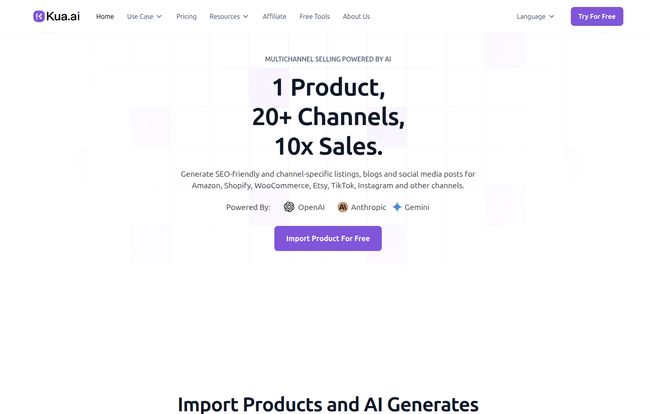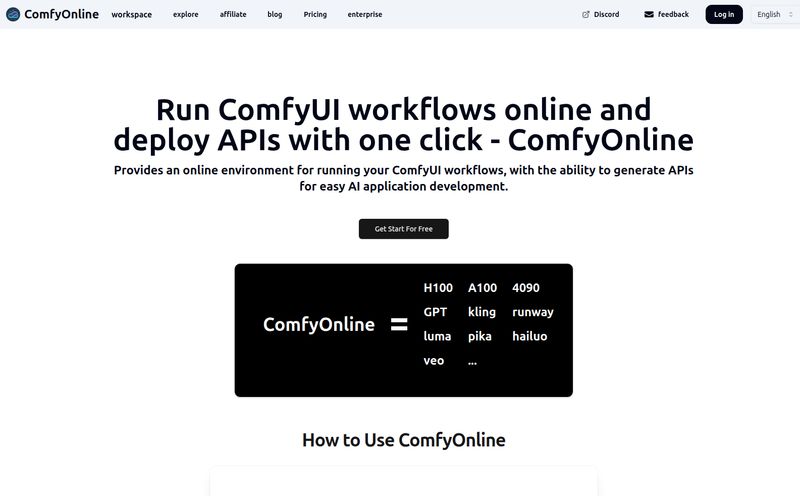The e-commerce content grind is real. It's a relentless treadmill of product descriptions, SEO-optimized blog posts, and a never-ending stream of social media updates. Honestly, some days it feels like you're running a content farm instead of an e-commerce business. Most of us got into this game to sell cool products and build a brand, not to become professional copywriters staring at a blinking cursor at 2 AM.
For years, the promise of AI has been dangling in front of us like a golden carrot. And while generalist tools like ChatGPT have been interesting, they often feel… well, general. They don't speak the specific language of Amazon A+ content, they dont understand the nuances of a Shopify product page, and they certainly don't have real-time Google search data baked in. It's like asking a brilliant novelist to write a technical manual; they can do it, but it's not their native tongue.
And then a tool like Kua.ai lands on my desk. I'm always a bit skeptical, but this one felt different from the jump. It doesn't try to be everything to everyone. Instead, it plants its flag firmly in e-commerce territory. And after spending some time with it, I have some thoughts. A lot of them, actually.
What Exactly is Kua.ai?
So what's the deal here? Kua.ai is an AI-powered content platform built from the ground up for one group of people: us. The e-commerce sellers, the brand managers, the agency folks who live and breathe product listings and conversion rates. It’s designed to create everything from your core Amazon or Shopify listings to the social media posts that drive traffic to them. And it does it by connecting directly to the data that matters.
Think of it this way. A generic AI writer is a Swiss Army knife—it has a lot of tools, but none of them are specialized. Kua.ai is more like a perfectly weighted chef's knife, designed for one primary purpose: to slice through the time-consuming and often frustrating task of creating high-quality e-commerce content. It's not just about spitting out words; it's about generating content that's informed by actual Amazon and Google data, which, for an SEO guy like me, is music to my ears.

Visit Kua.ai
The Features That Actually Matter to Sellers
A features list is just a list until you see how it solves a real problem. Kua.ai has a few standout capabilities that really address the pain points I see every day with my clients.
Multichannel Magic with Easy Imports
If you've ever manually copied and pasted product info from an Amazon listing to create a new one on Shopify, then tweaked it for Walmart, you know this specific brand of headache. Kua.ai lets you import your products directly from these major platforms. This isn't just a small convenience; it's a foundational workflow improvement. It means you can manage your content creation from a single dashboard, which is a massive time-saver for anyone selling on more than one channel. It turns a multi-hour copy-paste-edit job into a streamlined, almost pleasant, task.
Content That's Built to Convert
Here's where things get juicy. Kua.ai makes a big promise: "Deliver High-Traffic, High-Conversion Content." Bold words. But they back it up by integrating with Amazon ABA (Amazon Brand Analytics) data and Google Search Data. This means the AI isn't just guessing at good keywords. It's using real-world data to suggest terms that people are actually searching for. This is the difference between writing content that you think is good and writing content that the algorithms know is good. It also has features to help maintain a consistent brand voice across all generated content, which is critical for building a recognizable brand that customers trust.
Beyond Listings: A Full Content Factory
This platform isn't a one-trick pony. The "Kua Factory" concept, which they say can pump out over 500,000 listings a day, is impressive, even if it's more than any of us will ever need. But the real value for most sellers is that it extends beyond just the product page. You can generate SEO-optimized blog posts to build topical authority and social media content to engage your audience. I had a client last year who was crushing it on Amazon but their social media was a ghost town because they just didn't have the bandwidth. A tool like this could have been a game-changer for them, turning one set of product data into a month's worth of content across multiple platforms.
Let's Talk About the Money: Kua.ai Pricing
Alright, the all-important question: what's it going to cost? The pricing structure is actually pretty straightforward, which I appreciate. No confusing credit systems that require a PhD to understand.
| Plan | Price | Who It's For |
|---|---|---|
| Free Plan | Free | The tire-kicker. Perfect for getting a feel for the platform with 1 user, 30 chats, and 100 workflow credits. No-risk trial. |
| Pro Plan | $15.20 / month | The sweet spot for most small businesses and growing sellers. 5 users, generous content limits, and access to the crucial Google & Amazon data. |
| Enterprise Plan | $900 / year | The big leagues. For larger teams, agencies, and businesses needing API access and custom workflow development. |
My take? The Free plan is a genuine free plan, not just a crippled demo. You can get real work done with it. The Pro plan offers incredible value for the price, especially with 5 user seats included. The jump to Enterprise is significant, but for teams needing unlimited scale and API integration, it's a different kind of investment entirely.
The Good, The Bad, and The AI-Powered
No tool is perfect. As an SEO professional, I've seen my fair share of 'magic solutions' that fall flat. So let's get real about Kua.ai.
The good stuff is pretty obvious. It's a huge timesaver. As one Amazon seller, Shannon Hall, puts it in a testimonial on their site: "Using Kua.ai gives me outstanding product detail pages but in 1/10th the time." That's the core value proposition right there. The focus on e-commerce and integration with real search data makes the output genuinely useful, not just filler text.
A Few Things to Keep in Mind
Now, for the reality check. First, AI is a co-pilot, not an autopilot. You still need a human hand on the wheel. You should always review and tweak the generated content to ensure it perfectly matches your brand's voice and is 100% accurate. Think of Kua.ai as giving you an amazing first draft—maybe an 85% solution—that you then polish to 100%.
Second, while the interface is clean, unlocking the full power of custom AI workflows might have a slight learning curve. It's not rocket science, but you'll want to set aside an hour or two to really understand how to create the custom templates that will save you the most time in the long run. Lastly, while the Pro plan is a steal, the Enterprise plan's pricing might be a hurdle for some smaller businesses, though they likely don't need the advanced features anyway.
Who is Kua.ai Really For?
So, who should be clicking that 'Try For Free' button? In my professional opinion, Kua.ai is a near-perfect fit for:
- The Multichannel Seller: If you're juggling listings on Amazon, Shopify, and Walmart, this tool could become your new best friend.
- The Amazon FBA Pro: Someone managing a portfolio of dozens of SKUs will see an almost immediate return on their time investment.
- The Shopify Store Owner: Especially those who know they should be doing more with blogging and social media but can't find the time.
- Small E-commerce Agencies: The ability to add multiple users and manage content for different clients from one place is a workflow dream.
Who might not need it? If you're a blogger who doesn't sell physical products, or you have a single, simple product with no plans to expand, this might be overkill. It's a power tool for people who need to do a specific job at scale.
Your Kua.ai Questions Answered
Can Kua.ai write content in other languages?
Yes, one of its listed features is support for multiple languages and platforms, making it a strong contender for cross-border e-commerce sellers looking to expand into new markets.
Does Kua.ai integrate directly with my Shopify store?
It allows for easy one-click imports from major platforms including Shopify, Amazon, and Walmart. This streamlines the process of getting your product data into the tool to start generating content.
Is the AI content really unique and SEO-friendly?
The content is generated on-demand. What makes it particularly SEO-friendly is its integration with Google Search Data and Amazon ABA data, which helps it use relevant, high-traffic keywords. However, it's always best practice to review and add your own human touch.
What are "workflow credits" in the pricing plans?
Workflow credits are used when you run one of the AI tools or workflows. For example, generating a product listing or a set of social media posts would consume a certain number of credits. The Free and Pro plans come with a monthly allowance of these credits.
How does Kua.ai compare to a general tool like ChatGPT?
While ChatGPT is a powerful conversational AI, Kua.ai is a specialized tool. Its main advantages are direct e-commerce platform integration, built-in workflows for listings and posts, and its use of real-time Amazon and Google market data for optimization. It's purpose-built for the job.
My Final Thoughts on Kua.ai
After digging in, I'm genuinely impressed. Kua.ai isn't just another 'AI writer' in a sea of them. It's a thoughtful, specialized platform that understands the specific struggles of the modern e-commerce seller. It trades generic, do-everything promises for focused, practical tools that save time and, more importantly, create content that's designed to perform.
Is it a magic button that will run your business for you? Of course not. But it is an incredibly powerful assistant. For any e-commerce entrepreneur who feels like they're drowning in content tasks, Kua.ai is more than just a life raft—it's a speedboat. It's definitely worth taking the free plan for a spin.



